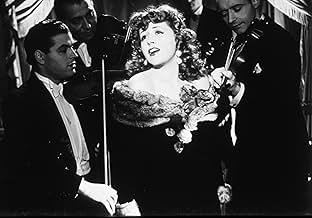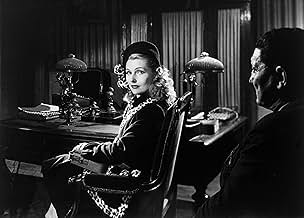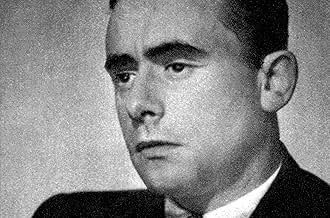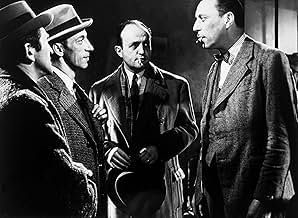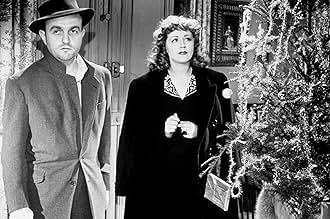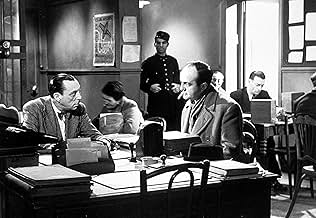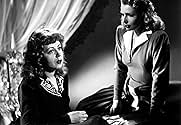VALUTAZIONE IMDb
7,7/10
6679
LA TUA VALUTAZIONE
Aggiungi una trama nella tua linguaA jealous husband intends to kill the man his wife is meeting for business, but arrives to find the deed already done.A jealous husband intends to kill the man his wife is meeting for business, but arrives to find the deed already done.A jealous husband intends to kill the man his wife is meeting for business, but arrives to find the deed already done.
- Regia
- Sceneggiatura
- Star
- Premi
- 2 vittorie e 1 candidatura in totale
Henri Arius
- Léopardi
- (as Arius)
Charles Blavette
- Le gendarme Poitevin
- (as Blavette)
René Blancard
- Le commissaire principal de la P.J.
- (as R. Blancard)
Robert Dalban
- Paulo
- (as R. Dalban)
Jean Daurand
- L'inspecteur Picard
- (as J. Daurand)
Jean Dunot
- Nitram
- (as J. Dunot)
Jacques Grétillat
- Auguste
- (as J. Grétillat)
Gilberte Géniat
- Mme Beauvoir
- (as G. Géniat)
Gabriel Gobin
- Le patron du bistrot
- (as G. Gobin)
François Joux
- L' officier de police Fayard
- (as F. Joux)
Recensioni in evidenza
Henri-Georges Clouzot's "Quai des Orfevres" (1947) stars Suzy Delair, Bernard Blier, Louis Jouvet, and Charles Dullin. The story takes place in post-war Paris, where an accompanist, Maurice Martineau (Blier) lives with his singer wife, Marguerite, better known as Jenny Lamour (Suzy Delair). An important man, Georges Brignon (Dullin) promises Jenny work, and because she's ambitious, she flirts with him. Maurice is an extremely jealous man, so he finds Brignon in a restaurant and threatens him.
Later on, Jenny tells Maurice she is visiting her grandmother, who lives in another town. This gives Maurice a good opportunity to bump off Brignon, especially when he finds the man's address on a piece of paper in the kitchen and realizes Jenny was lying. But when he gets to Brignon's house, Brignon is already dead.
Inspector Antoine (Juvet) is assigned to the case, and it doesn't take him long to realize that some alibis aren't very secure.
Wonderful film, with the excellent Juvet outstanding as Inspector Antoine, and an excellent performance by Simone Renant as a lesbian photographer, Dora, in love with Jenny. Delair, who was involved with Clouzot, is good as a lower-class woman who loves her husband but wants to get ahead in show business as well.
This is Clouzot at his best, with a witty script with some plot twists and a true Parisian atmosphere.
Later on, Jenny tells Maurice she is visiting her grandmother, who lives in another town. This gives Maurice a good opportunity to bump off Brignon, especially when he finds the man's address on a piece of paper in the kitchen and realizes Jenny was lying. But when he gets to Brignon's house, Brignon is already dead.
Inspector Antoine (Juvet) is assigned to the case, and it doesn't take him long to realize that some alibis aren't very secure.
Wonderful film, with the excellent Juvet outstanding as Inspector Antoine, and an excellent performance by Simone Renant as a lesbian photographer, Dora, in love with Jenny. Delair, who was involved with Clouzot, is good as a lower-class woman who loves her husband but wants to get ahead in show business as well.
This is Clouzot at his best, with a witty script with some plot twists and a true Parisian atmosphere.
The extraordinarily adorable Suzy Delair plays a statuesque performer obsessed with succeeding in the theater. Her husband and accompanist, played by Bernard Blier, is a composed but jealous man. When he finds out in a less than preferable way that his flashy wife has planned a rendezvous with a lecherous old businessman with the intention of advancing her career, he loses all control and threatens the businessman with murder. Now, at that point, I must stop describing the film to you because it skates on such thin ice with its twists, revelations, ambiguities and suspense that to imply any of it would endanger it. I am not sure how good or bad that is for this French police procedural emanating from the song- and-dance community, though it is certainly interesting that what we do know throughout is who did not do it. We just don't know who did.
The story depends upon the procedure of following clues, where ideal alibis fail and where cautiously created fabrications and deceptions disintegrate. Interestingly, this is a suspense film in which suspense is generated in spite of the knowledge one would traditionally think too much too soon.
Quay of the Goldsmiths is the least dark of Henri-Georges Clouzot's films. It's nowhere near as sinister as the shocking Les Diaboliques, as tragic as the riveting Wages of Fear or as eery as Le Corbeau. Maybe it is due to the vibrance of the dance halls and theater settings of 1940s France, which all work as the milieu of this crime thriller.
Clouzot both understands and approves of his characters, even the more rotten ones, where he has more of a vindictive streak with his other films. Where he may have had understanding for the scheming women in Les Diabolique or the truck drivers who sink to the level of risking horrible death in order to oust themselves from miserable life in The Wages of Fear, there isn't necessarily support or agreement on the part of the filmmaker, for these are characters who plainly made the direct decisions that determine their fate. All the characters in this more settling film have scenes and moments that endear us to them, even the harsh, cold detective played by Louis Jouvet, who worries about his young adoptive son amid all the trouble and despair that happens in his life at any time with the drop of a hat.
There is humor and unabashed sexiness, the latter mostly on the part of Delair, that neutralize the pressure to a degree. Clouzot was quietly practicing his craft, patient till he made his unrelenting later films, in which he would permit his audiences no pardon from the tension.
The story depends upon the procedure of following clues, where ideal alibis fail and where cautiously created fabrications and deceptions disintegrate. Interestingly, this is a suspense film in which suspense is generated in spite of the knowledge one would traditionally think too much too soon.
Quay of the Goldsmiths is the least dark of Henri-Georges Clouzot's films. It's nowhere near as sinister as the shocking Les Diaboliques, as tragic as the riveting Wages of Fear or as eery as Le Corbeau. Maybe it is due to the vibrance of the dance halls and theater settings of 1940s France, which all work as the milieu of this crime thriller.
Clouzot both understands and approves of his characters, even the more rotten ones, where he has more of a vindictive streak with his other films. Where he may have had understanding for the scheming women in Les Diabolique or the truck drivers who sink to the level of risking horrible death in order to oust themselves from miserable life in The Wages of Fear, there isn't necessarily support or agreement on the part of the filmmaker, for these are characters who plainly made the direct decisions that determine their fate. All the characters in this more settling film have scenes and moments that endear us to them, even the harsh, cold detective played by Louis Jouvet, who worries about his young adoptive son amid all the trouble and despair that happens in his life at any time with the drop of a hat.
There is humor and unabashed sexiness, the latter mostly on the part of Delair, that neutralize the pressure to a degree. Clouzot was quietly practicing his craft, patient till he made his unrelenting later films, in which he would permit his audiences no pardon from the tension.
In the postwar Paris, the accompanist pianist Maurice Martineau (Bernard Blier) is a jealous man from the upper class married with the ambitious singer Marguerite Chauffournier Martineau, most known by her artistic name Jenny Lamour (Suzy Delair), a woman with past from the lower classes. When the lecher but powerful Georges Brignon (Charles Dullin) harasses and invites Jenny for dinner promising a role in a film, Maurice goes to the restaurant and threatens Brignon. A couple of days later, Jenny tells Maurice that she is going to visit her grandmother in another town. However, her husband finds a piece of paper hidden in the kitchen with Brignon's address. Maurice goes to the theater to have an alibi and heads to Brignon's manor during the show with the intention of killing the old man. However, he finds Brignon's house open and the man dead on the floor. When he leaves the crime scene, his car is stolen and Maurice has to walk back to the theater. Meanwhile, Jenny arrives in the house of the lesbian photographer Dora Monier (Simone Renant), who is an old friend of Maurice and has a crush on Jenny, and tells Dora that she has just killed Brignon. But Jenny notes that she had forgotten her fur on the couch in the living room of Brignon's house and Dora takes a cab to retrieve the stole. Inspector Antoine (Louis Jouvet) is assigned to investigate the case and sooner he visits Jenny, Maurice and Dora to check their alibis for that night in the beginning of his investigation.
"Quai des Orfèvres" is an amusing story of an efficient detective investigating a murder in a comedy of errors of the three lead suspects. Henri-Georges Clouzot is one of the best French directors ever and "Quais des Orfèvres" is another gem in his filmography. The witty screenplay has many twists and is supported by the magnificent cinematography in black-and-white and awesome performances. Bernard Blier, the father of Bertrand Blier, is perfect in the role of a jealous cuckold without confidence in his wife and self-respect. Suzy Delair performs an ambitious woman that has a past with lovers and wants to climb positions in the show-business, but loves her husband. Simone Renant is great in the role of a lesbian photographer. But who steals the film is Louis Jouvet, in the role of a detective that seems to be naive, but is capable to find the truth that each character intends to hide. My understanding is that Antoine might be gay since he does not like women. My vote is eight.
Title (Brazil): "Crime em Paris" ("Crime in Paris")
"Quai des Orfèvres" is an amusing story of an efficient detective investigating a murder in a comedy of errors of the three lead suspects. Henri-Georges Clouzot is one of the best French directors ever and "Quais des Orfèvres" is another gem in his filmography. The witty screenplay has many twists and is supported by the magnificent cinematography in black-and-white and awesome performances. Bernard Blier, the father of Bertrand Blier, is perfect in the role of a jealous cuckold without confidence in his wife and self-respect. Suzy Delair performs an ambitious woman that has a past with lovers and wants to climb positions in the show-business, but loves her husband. Simone Renant is great in the role of a lesbian photographer. But who steals the film is Louis Jouvet, in the role of a detective that seems to be naive, but is capable to find the truth that each character intends to hide. My understanding is that Antoine might be gay since he does not like women. My vote is eight.
Title (Brazil): "Crime em Paris" ("Crime in Paris")
10jotix100
"Quai des Orfevres", directed by the brilliant Henri-Georges Clouzot, is a film to treasure because it is one of the best exponents of French film making of the postwar years. M. Clouzot, adapting the Steeman's novel, "Longtime Defence", shows his genius in the way he sets the story and in the way he interconnects all the characters in this deeply satisfying movie that, as DBDumonteil has pointed out in this forum, it demonstrates how influential Cluzot was and how much the next generation of French movie makers are indebted to the master, especially Claude Chabrol.
The crisp black and white cinematography by Armand Thirard has been magnificently transferred to the Criterion DVD we recently watched. Working with Clouzot, Thirard makes the most of the dark tones and the shadows in most of the key scenes. The music by Francis Lopez, a man who created light music and operettas in France, works well in the context of the film, since the action takes place in the world of the music halls and night clubs.
Louis Jouvet, who is seen as a police detective, is perfect in the part. This was one of his best screen appearances for an actor who was a pillar of the French theater. Jouvet clearly understood well the mechanics for the creation of his police inspector who is wiser and can look deeply into the souls of his suspects and ultimately steals the show from the others. In an unfair comment by someone in this page, Jouvet's inspector is compared with Peter Falk's Columbo, the television detective. Frankly, and no disrespect to Mr. Falk intended, it's like comparing a great champagne to a good house wine.
Bernard Blier is perfect as the jealous husband. Blier had the kind of face that one could associate with the man consumed with the passion his wife Jenny Lamour has awakened in him. Martineau is vulnerable and doesn't act rationally; he is an easy suspect because he has done everything wrong as he finds in the middle of a crime he didn't commit, but all the evidence points to the contrary.
The other great character in the film is Dora, the photographer. It's clear by the way she interacts with Jenny where her real interest lies. Simone Renant is tragically appealing as this troubled woman and makes an enormous contribution to the film. Suzy Delair, playing Jenny, is appealing as the singer who suddenly leaps from obscurity to celebrity and attracts the kind of men like Brignon, the old lecher.
The film is one of the best Clouzot directed during his distinguished career and one that will live forever because the way he brought all the elements together.
The crisp black and white cinematography by Armand Thirard has been magnificently transferred to the Criterion DVD we recently watched. Working with Clouzot, Thirard makes the most of the dark tones and the shadows in most of the key scenes. The music by Francis Lopez, a man who created light music and operettas in France, works well in the context of the film, since the action takes place in the world of the music halls and night clubs.
Louis Jouvet, who is seen as a police detective, is perfect in the part. This was one of his best screen appearances for an actor who was a pillar of the French theater. Jouvet clearly understood well the mechanics for the creation of his police inspector who is wiser and can look deeply into the souls of his suspects and ultimately steals the show from the others. In an unfair comment by someone in this page, Jouvet's inspector is compared with Peter Falk's Columbo, the television detective. Frankly, and no disrespect to Mr. Falk intended, it's like comparing a great champagne to a good house wine.
Bernard Blier is perfect as the jealous husband. Blier had the kind of face that one could associate with the man consumed with the passion his wife Jenny Lamour has awakened in him. Martineau is vulnerable and doesn't act rationally; he is an easy suspect because he has done everything wrong as he finds in the middle of a crime he didn't commit, but all the evidence points to the contrary.
The other great character in the film is Dora, the photographer. It's clear by the way she interacts with Jenny where her real interest lies. Simone Renant is tragically appealing as this troubled woman and makes an enormous contribution to the film. Suzy Delair, playing Jenny, is appealing as the singer who suddenly leaps from obscurity to celebrity and attracts the kind of men like Brignon, the old lecher.
The film is one of the best Clouzot directed during his distinguished career and one that will live forever because the way he brought all the elements together.
It takes a while for the scene to set, a subtle intriguing build up, just as you'd expect, but where is it going, this to-ing and fro-ing, as the alibis and excuses unwind and reset? To somewhere quite unexpected is the answer.
Lo sapevi?
- QuizHenri-Georges Clouzot wrote almost two-thirds of the film only having read the novel years before, recalling it from memory, since it was out of print by the time he started the screenplay. When the novelist Stanislas-André Steeman saw the film, he was furious about the differences between the novel and the film.
- BlooperWhen Antoine is repeating Maurice's deposition to the typist, he says that the confrontation between Maurice and Brignon at the restaurant took place on Wednesday, December 2, 1946. In 1946, December 2 fell on a Monday.
- Citazioni
L'inspecteur adjoint Antoine: I have to admit, I've taken a liking to you, Miss Dora Monier.
Dora Monier: Me?
L'inspecteur adjoint Antoine: Because I have to say, you're just my type. When it comes to women, we'll never have a chance.
- ConnessioniEdited into Histoire(s) du cinéma: La monnaie de l'absolu (1999)
I più visti
Accedi per valutare e creare un elenco di titoli salvati per ottenere consigli personalizzati
Dettagli
- Data di uscita
- Paese di origine
- Sito ufficiale
- Lingua
- Celebre anche come
- Jenny Lamour
- Luoghi delle riprese
- Parigi, Francia(Exterior)
- Azienda produttrice
- Vedi altri crediti dell’azienda su IMDbPro
Botteghino
- Lordo Stati Uniti e Canada
- 180.974 USD
- Fine settimana di apertura Stati Uniti e Canada
- 9632 USD
- 27 ott 2002
- Lordo in tutto il mondo
- 181.041 USD
- Tempo di esecuzione1 ora 46 minuti
- Colore
- Proporzioni
- 1.37 : 1
Contribuisci a questa pagina
Suggerisci una modifica o aggiungi i contenuti mancanti

Divario superiore
By what name was Legittima difesa (1947) officially released in Canada in English?
Rispondi
![Guarda Bande-annonce [OV]](https://m.media-amazon.com/images/M/MV5BMmI1MGQ3ZWItMWI3Yi00M2RhLTkwMzEtODUyZWE5NmVhZGRlXkEyXkFqcGdeQXRyYW5zY29kZS13b3JrZmxvdw@@._V1_QL75_UX500_CR0)
